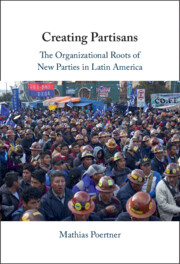Book contents
- Frontmatter
- Dedication
- Contents
- Figures
- Tables
- Acknowledgments
- 1 Introduction
- 2 Explaining Mass Support for New Parties
- Part I Development of Mobilization Strategies
- Part II Implications for Mass Support
- 6 Mechanisms of Electoral Support
- 7 Resulting Electoral Support
- 8 Resulting Party Identification
- 9 Conclusion
- References
- Index
8 - Resulting Party Identification
Bolivia, Ecuador, and Mexico
from Part II - Implications for Mass Support
Published online by Cambridge University Press: 07 December 2024
- Frontmatter
- Dedication
- Contents
- Figures
- Tables
- Acknowledgments
- 1 Introduction
- 2 Explaining Mass Support for New Parties
- Part I Development of Mobilization Strategies
- Part II Implications for Mass Support
- 6 Mechanisms of Electoral Support
- 7 Resulting Electoral Support
- 8 Resulting Party Identification
- 9 Conclusion
- References
- Index
Summary
This chapter explores the resulting party identification in the three cases. Drawing on original and existing survey data, it shows that membership in organizations that regularly support a new party is strongly associated with whether a voter develops an attachment to the party. Further analysis of the poster experiments suggests that the frequency of attending organization meetings is associated with the robustness of the attachment. Additional analyses of the natural experiment reveal that repeated organizational expressions of support over multiple years help new parties gain new followers. It then compares and contrasts this organizationally mediated path to partisanship (organizational cultivation), which can account for the development of robust partisan attachments to the MAS and MORENA, with an alternative path to partisanship that can yield party identification even for parties without organically linked organizational allies. In the case of Alianza PAIS, which could not rely on organizational cultivation through organically linked organizations, partisan attachments have developed in direct response to voters’ evaluations of the party’s performance.
Keywords
- Type
- Chapter
- Information
- Creating PartisansThe Organizational Roots of New Parties in Latin America, pp. 181 - 211Publisher: Cambridge University PressPrint publication year: 2024

